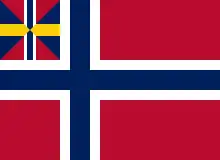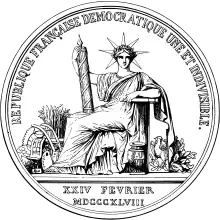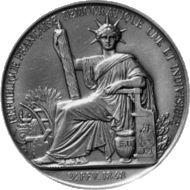Édouard Drouyn de Lhuys
Édouard Drouyn de Lhuys (pronounced [edwaːʁ dʁuɛ̃ də‿lɥis]; 19 November 1805 – 1 March 1881) was a French diplomat. Born in Paris, he was educated at the Lycée Louis-le-Grand. The scion of a wealthy and noble house, he excelled in rhetoric. He quickly became interested in politics and diplomacy.


Biography
He was ambassador to the Netherlands and Spain, and distinguished himself by his opposition to Guizot. Drouyn de Lhuys served as Minister of Foreign Affairs from 1848 to 1849 in the first government of Odilon Barrot. In Barrot's second government, he was replaced by Alexis de Tocqueville, and was appointed ambassador to Great Britain. He returned briefly as foreign minister for a few days in January 1851, and then returned permanently in the summer of 1852, becoming the first foreign minister of the Second Empire. He resigned his post in 1855, during the Crimean War, when the peace preliminaries he had agreed to in consultation with the British and Austrians at Vienna were rejected by Napoleon III.
Drouyn de Lhuys returned to power 7 years later, in 1862, when foreign minister Édouard Thouvenel resigned over differences with Napoleon on Italian affairs. Drouyn was thus foreign minister in the lead-up to the Austro-Prussian War. He commented that, "the Emperor has immense desires and limited abilities. He wants to do extraordinary things but is only capable of extravagances."[1] In the aftermath of that war, which was disastrous to French interests in Europe, Drouyn resigned and withdrew into private life.
Honours
.svg.png.webp) Two Sicilies: Knight of the Illustrious Royal Order of Saint Januarius, 1852[2]
Two Sicilies: Knight of the Illustrious Royal Order of Saint Januarius, 1852[2] Grand Duchy of Hesse: Grand Cross of the Grand Ducal Hessian Order of Ludwig, 11 February 1853[3]
Grand Duchy of Hesse: Grand Cross of the Grand Ducal Hessian Order of Ludwig, 11 February 1853[3].svg.png.webp) Spain: Grand Cross of the Royal and Distinguished Order of Charles III, 27 January 1854[4]
Spain: Grand Cross of the Royal and Distinguished Order of Charles III, 27 January 1854[4].svg.png.webp) Belgium: Grand Cordon of the Order of Leopold (civil division), 23 July 1854[5]
Belgium: Grand Cordon of the Order of Leopold (civil division), 23 July 1854[5] Grand Duchy of Tuscany: Grand Cross of the Order of Saint Joseph[6]
Grand Duchy of Tuscany: Grand Cross of the Order of Saint Joseph[6] Austria: Grand Cross of the Royal Hungarian Order of Saint Stephen, 1855[7]
Austria: Grand Cross of the Royal Hungarian Order of Saint Stephen, 1855[7].svg.png.webp) Mexican Empire: Grand Cross of the Imperial Order of Guadalupe, 1864[8]
Mexican Empire: Grand Cross of the Imperial Order of Guadalupe, 1864[8].svg.png.webp)
 Sweden-Norway: Knight of the Royal Order of the Seraphim, 27 March 1865[9]
Sweden-Norway: Knight of the Royal Order of the Seraphim, 27 March 1865[9] Monaco: Grand Cross of the Order of Saint-Charles, 24 December 1865[10]
Monaco: Grand Cross of the Order of Saint-Charles, 24 December 1865[10]
References
- Roger Price (2001). The French Second Empire: An Anatomy of Political Power. p. 407. ISBN 9781139430975.
- Napoli (Stato) (1857). Almanacco reale del Regno delle Due Sicilie: per l'anno ... Stamp. Reale. p. 401.
- "Großherzogliche Orden und Ehrenzeichen", Staatshandbuch für das Großherzogtum Hessen und bei Rhein (in German), Darmstadt: Staatsverlag, 1879, p. 22 – via archive.org
- "Real y distinguida orden de Carlos III", Guía Oficial de España (in Spanish), 1868, p. 168
- "Liste des Membres de Ordre de Leopold". Almanach royal officiel de Belgique. Librairie polytechnique De Decq. 1855. p. 36.
- Almanacco Toscano per l'anno 1855. Stamperia Granducale. 1855. p. 272.
- "A Szent István Rend tagjai" Archived 22 December 2010 at the Wayback Machine
- "Seccion IV: Ordenes del Imperio", Almanaque imperial para el año 1866 (in Spanish), Mexico City: Imp. de J.M. Lara, 1866, p. 244, archived from the original on 28 October 2020, retrieved 13 September 2020
- Sveriges statskalender (in Swedish), 1881, p. 377 – via runeberg.org
- Sovereign Ordonnance of 24 December 1865
- Obituary. Edouard Drouyn-de-Lhuys. The New York Times, 3 March 1881. Accessed 7 October 2008
- The Illustrated London News, May 19, 1855.
Further reading
- Schnerb, Robert. "Napoleon III and the Second French Empire." Journal of Modern History 8.3 (1936): 338–355. online
- Schulz, Matthias. "A Balancing Act: Domestic Pressures and International Systemic Constraints in the Foreign Policies of the Great Powers, 1848–1851." German History 21.3 (2003): 319–346.
- Spencer, Warren Frank. Edouard Drouyn de Lhuys and the Foreign Policy of the Second Empire (PhD dissertation University of Pennsylvania, 1955).
See also
This article incorporates text from a publication now in the public domain: Wood, James, ed. (1907). The Nuttall Encyclopædia. London and New York: Frederick Warne. {{cite encyclopedia}}: Missing or empty |title= (help)



.svg.png.webp)